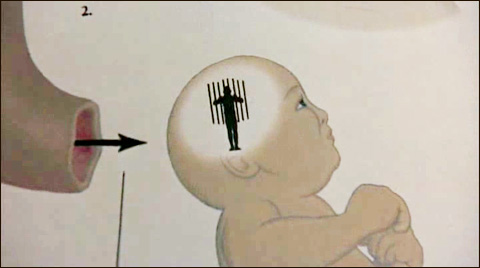
On the message board at snopes.com, someone posting under the name "Manzanita SOL" writes, in a thread titled "Truly stupid lines in movies," the following: "I'm surprised nobody mentioned one of Cameron Diaz's lines in Being John Malkovich. Her character is being locked in a cage by the puppeteer (John Cusack? yes? no?) and as he does so, she screams 'You're locking me in a cage!'" The reason no one mentioned that line is that, as silly as it might seem out of context, it's actually a linchpin of the entire movie. Remember that early on we learn that Lotte has taught her parrot to squawk, "Help! She's locking me in a cage!" at appropriate moments, prompting her neighbor to scream, "SHUUUT UUUP!!" I guess Manzanita SOL failed to notice that the neighbor has the same reaction when Lotte screams the offending line, explaining why no one comes to the aid of a woman calling for help. But forget about the plot point! The line is even more important thematically: one of the central ideas of the film is the notion that being incarnated in the flesh of a particular conscious being is tantamount to imprisonment. I've talked about this with Elizabeth. She doesn't much like it because of the dualism it implies. I agree that the mind is a byproduct of biochemical processes and that if you change the brain (drugs, tumors, electricity, etc.) you change the mind. But that isn't how consciousness feels. It feels, at least to me, as if I'm inside, looking out. And insofar as my thirty-sixth year has been full of inexplicable pains, cancer scares, and autoimmune teeth, and I haven't been able to bail out in favor of a more robust vessel, increasingly I find myself feeling like the little silhouette in the picture up there. Here are a couple of movies featuring characters who for various reasons could say the same.
The Talented Mr. Ripley "I'm gonna be stuck in the basement, aren't I, aren't I, that's my... terrible, and alone, and dark, and I've lied about who I am, and where I am, and now no one will ever find me," rambles the protagonist at the end of this movie. It's a speech that could just as easily apply to the fate of Malkovich in Being. The difference is that this time it isn't an outside agent that is about to keep the title character's true self from ever seeing the light of day.
Apparently the novel on which this movie is based hinted at homosexual themes.
This movie brings them to the surface. Basically you've got a gay man of
humble origins who manages to fall in with some trust-fund types. For much
of the running time he attempts to maintain a double identity, spending half
his time posing as a privileged straight man and the other half as someone
closer to his true self. In the end, events conspire to make him choose, and
he elects to shove his gay side into the
Boys Don't Cry Unlike Tom Ripley, Teena Brandon doesn't even think of herself as gay; she sees herself as a guy who has somehow become trapped in the wrong type of vessel. But the movie strikes even closer to the phenomenon I mentioned above when the protagonist's deception is uncovered and she's stuck in a small bedroom in a shabby house in Falls City, Nebraska, with two drunk, hostile ex-cons right outside the door, and her girlfriend looks out the window and says, "Look how beautiful it is out there. That's us — we can just beam ourselves out there." It's a nice thought. But unfortunately there is no Ovoid mind trick in real life that you can resort to when the body you inhabit is in a tight spot. Of course, Lana isn't really talking about literally beaming their minds into different bodies — it's a metaphor for fleeing Falls City, Nebraska. Good idea! This movie is so unpleasant: watching it basically means spending two hours surrounded by drunk/stoned rednecks, engulfed in their cigarette smoke. Like Brokeback Mountain, it raises the question, why not just get out? Go to San Francisco, or Northampton, or really anywhere else. In the movie they talk about Memphis and I guess that, yeah, even that would be marginally less sucky. And the answer, I guess, is that the cages the characters are locked in aren't just biological but socioeconomic and cultural as well. The movie ends with Lana finally escaping to a place with bright lights. In real life, a few years after she left she moved right back to fuckin' Falls City.
Return to the Calendar page! |